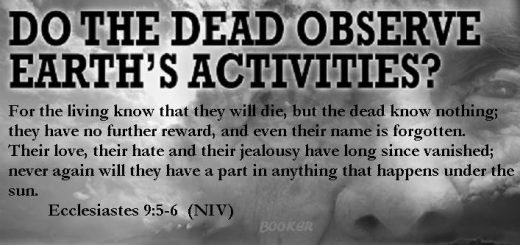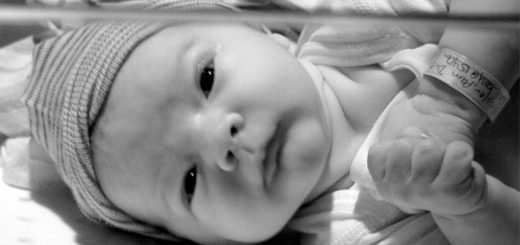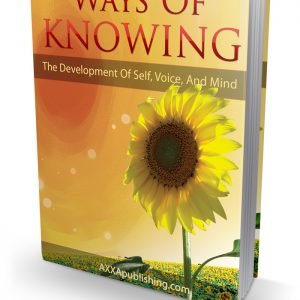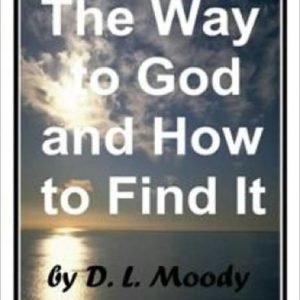He died July 15th 2013, he went somewhere, he was sorted and he lives again for this is the multiverse
The gentlemen in this video died in an auto accident. He traveled to somewhere where he saw multiple realities of the accident, before and after it happened, all with different outcomes. He could not remember how he was there, why or where he was supposed to go… He was only aware of what was happening, while it was happening and the great wheel, which seemed determined to sort him into one of these realities. The great wheel seemed to not care at all, which reality, or if it was in 3 mins, 3 hours, 3 years or 3,000 years… Listen to his story for yourself and find your own reckoning with it…
Millions of people have had Near Death Experiences (NDE’s) and even more claim to have had Out of Body Experiences (OBE’s). This is one gentleman’s account. If you would like to share yours, submit it and we will narrate it for you and put it to video.
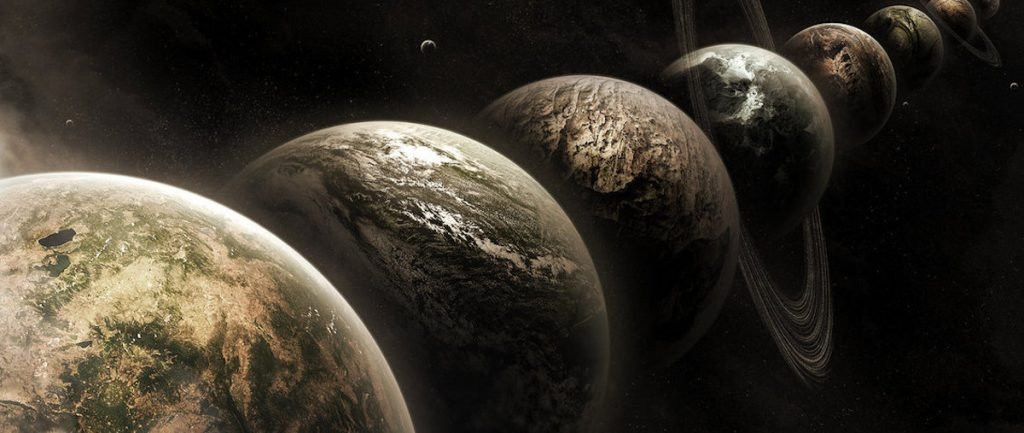
In the course of a long life, each of us will occasionally encounter a difficult decision we must make. Stay single or get married? Go for a run or have another doughnut? Go to grad school or enter the real world?
Wouldn’t it be nice to be able to choose both sides, rather than picking one? Quantum mechanics suggests a strategy: whenever you have a decision to make, you can do so by consulting a quantum random-number generator. Indeed, there is an app available for iPhones called Universe Splitter that can be used for this very purpose. (As Dave Barry says, I swear I am not making this up.)
Let’s say you have a choice to make: “Should I get pepperoni or sausage on my pizza?” (And let’s say you have too much restraint to give the obvious answer of asking for both on the same pizza.) You can fire up Universe Splitter, where you will see two text boxes, into which you can type “pepperoni” and “sausage.” Then hit the button, and your phone will send a signal through the internet to a laboratory in Switzerland, where a photon is sent toward a beam splitter (essentially a partially silvered mirror that reflects some photons and lets others through).
According to the Schrödinger equation, the beam splitter turns the photon’s wave function into two components going left and right, each of which heads toward a different detector. When either detector notices a photon, it produces a readout that becomes entangled with the environment, quickly leading to decoherence and branching the wave function in two. The copy of you in the branch where the photon went left sees their phone flash with the message “pepperoni,” and in the one where it went right, they see “sausage.” If each one actually follows up with your plan to do what your phone advises, there will be one world in which a version of you orders pepperoni, and another in which a version of you orders sausage. Sadly, the two persons have no way of communicating with each other to share tasting notes afterward.
Even for the most battle-hardened quantum physicist, one must admit that this sounds ludicrous. But it’s the most straightforward reading of our best understanding of quantum mechanics.
The question naturally arises: What should we do about it? If the real world is truly this radically different from the world of our everyday experience, does this have any implications for how we live our lives?
Largely—no. To each individual on some branch of the wave function, life goes on just as if they lived in a single world with truly stochastic quantum events. But the issues are worth exploring.
You are welcome to offload your hard decisions to a quantum random-number generator, thereby ensuring that there is at least one branch of the wave function in which the best alternative was chosen. But let’s say we choose not to. Should the branching of our current selves into multiple future selves affect the choices we make? In the textbook view, there is a probability that one or another outcome happens when we observe a quantum system, while in Many-Worlds all outcomes happen, weighted by the amplitude squared of the wave function. Does the existence of all those extra worlds have implications for how we should act, personally or ethically?
It’s not hard to imagine that it might, but upon careful consideration it turns out to matter much less than you might guess. Consider the infamous quantum suicide experiment, or the related idea of quantum immortality. It’s an idea that has been considered ever since Many-Worlds came on the scene—reportedly Hugh Everett himself believed a version of quantum immortality—but has been popularized by physicist Max Tegmark.
Much of how we think about our current lives depends on a projection into the rest of our existence.
Here’s the setup: we imagine a deadly device that is triggered by a quantum measurement, such as sending a query to the Universe Splitter app. Imagine that the quantum measurement has a 50 percent chance of triggering a gun that shoots a bullet into my head at close range, and a 50 percent chance of doing nothing. According to Many-Worlds, that implies the existence of two branches of the wave function, one of which contains a living version of me, the other of which contains a dead version.
Assume for purposes of the thought experiment we believe that life itself is a purely physical phenomenon, so we can set aside considerations of life after death. From my perspective, the branch on which the gun fired isn’t one that any version of me ever gets to experience—my descendant in that world is dead. But my descendant continues on, unharmed, on the branch where the gun didn’t fire. In some sense, then, “I” will live forever, even if I repeat this macabre procedure over and over again.
One might go so far as to argue that I shouldn’t object to actually going through this experiment (putting aside the rest of the world’s feelings about me, I suppose)—in the branches where the gun fired “I” don’t really exist, while in the single branch where it failed to fire time after time I’m perfectly healthy. (Tegmark’s original point was less grandiose: he simply noted that an experimenter who survived a large number of trials would have good reason to accept the Everett picture.) This conclusion stands in stark contrast to a conventional stochastic formulation of quantum mechanics, where there is only one world, and I would have an increasingly tiny chance of being alive within it.
I do not recommend that you try such an experiment at home. In fact, the logic behind not caring about those branches in which you are killed is more than a little wonky.
Consider life in an old-fashioned, classical, single-universe picture. If you thought you lived in such a universe, would you mind if someone sneaked up behind you and shot you in the head so that you died instantly? (Again, setting aside the possibility that other people might be upset.) Most of us would not be in favor of that happening. But by the logic above, you really shouldn’t “mind”—after all, once you’re dead, there’s no “you” to be upset about what happened.
The point being missed by this analysis is that we are upset now—while we are still very much alive and feeling—by the prospect of being dead in the future, especially if that future comes sooner rather than later. And that’s a valid perspective; much of how we think about our current lives depends on a projection into the rest of our existence. Cutting that existence off is something we are perfectly allowed to object to, even if we won’t be around to be bothered by it once it happens.
And given that, quantum suicide turns out to be just as bleak and unpalatable as our immediate intuition might suggest. It’s okay for me to yearn for a happy and long life for all the future versions of me that will end up in various branches of the wave function, as much as it would be valid for me to hope for a long life if I thought there was just a single world.
This goes back to the importance of treating individuals on different branches of the wave function as distinct persons, even if they descended from the same individual in the past. There is an important asymmetry between how we think about “our future” versus “our past” in Many-Worlds, which ultimately can be attributed to the low-entropy condition of our early universe.
Any one individual can trace their lives backward in a unique person, but going forward in time we will branch into multiple people. There is not one future self that is picked out as “really you,” and it’s equally true that there is no one person constituted by all of those future individuals. They are separate, as much as identical twins are distinct people, despite descending from a single zygote.
We might care about what happens to the versions of ourselves who live on other branches, but it’s not sensible to think of them as “us.” Imagine that you’re just about to perform a vertical-spin measurement on an electron you have prepared in an equal superposition of spin‑up and spin-down. A random philanthropist enters your lab and offers you the following bargain: if the spin is up, they will give you a million dollars; if the spin is down, you give them one dollar. You would be wise to take the deal; for all intents and purposes, it’s as if you are being offered a bet with equal chances of winning a million dollars or losing just one dollar, even if one of your future selves will certainly be out a dollar.
But now imagine that you were a little quicker in your experimental setup, and you observed a spin-down outcome just before the philanthropist busts in. It turns out that they are a pushy dealmaker, and they explain that the version of you on the other branch is being given a million dollars, but you now have to give them one dollar in this branch.
There’s no reason for you to be happy about this (or to give up the dollar), even though the version of you on the other branch might be happy about it. You are not them, and they are not part of you. Post- branching, you’re two different people. Neither your experiences nor your rewards should be thought of as being shared by various copies of you on different branches. Don’t play quantum Russian roulette, and don’t accept losing bargains from pushy philanthropists.
That may be a reasonable policy when it comes to your own well-being, but what about that of others? How does knowing about the existence of other worlds affect our notions of moral or ethical behavior?
The right way to think about morality is itself a controversial subject, even in single-world versions of reality, but it’s instructive to consider two broad categories of moral theory: deontology and consequentialism. Deontologists hold that moral behavior is a matter of obeying the right rules; actions are inherently right or wrong, whatever their consequences might turn out to be. Consequentialists, unsurprisingly, have the alternative view: we should work to maximize the beneficent consequences of our actions. Utilitarian’s, who advocate maximizing some measure of overall well-being, are paradigmatic consequentialists. There are other options, but these illustrate the basic point.
Deontology would seem to be unaffected by the possible presence of other worlds. If the whole point of your theory is that actions are intrinsically right or wrong, regardless of what outcomes they lead to, the existence of more worlds in which those outcomes can occur doesn’t really matter. A typical deontological rule is Kant’s categorical imperative: “Act only according to that maxim whereby you can, at the same time, will that it should become a universal law.” It seems like it would be safe here to replace “a universal law” by “a law holding in all branches of the wave function,” without altering any substantive judgment about what kind of actions might qualify.
The picture of branching as “creating” an entirely new copy of the universe is a vivid one, but not quite right.
Consequentialism is another matter entirely. Imagine that you are a no‑nonsense utilitarian, who believes there is a quantity called utility that measures the amount of well-being associated with conscious creatures, and that this quantity can be added among all creatures to obtain a total utility, and that the morally right course of action is the one that maximizes this total utility. Imagine further that you judge the total utility in the entire universe to be some positive number. (If you didn’t, you’d be in favor of trying somehow to destroy the universe, which makes for a good supervillain origin story but not for good neighbors.)
It would follow that, if the universe has positive utility and our goal is to maximize utility, creating a new copy of the whole universe would
be one of the most morally valorous actions you could possibly take. The right thing to do would then be to branch the wave function of the universe as often as possible. We could imagine building a quantum utility maximizing device (QUMaD), perhaps an apparatus that continually bounces electrons through a device that measures first their vertical spin, then their horizontal spin. Every time an electron undergoes either measurement, the universe branches in two, doubling the total utility of all universes. Having built QUMaD and turned it on, you would be the most moral person ever to live!
Something about this smells fishy, however. Turning on QUMaD has no impact whatsoever on the lives of people in this universe or any other. They don’t even know the machine exists. Are we really sure it has such a morally praiseworthy effect?
Happily there are a couple of ways out of this puzzle. One is to deny the assumptions: maybe this kind of no‑nonsense utilitarianism isn’t the best moral theory. There is a long and honorable tradition of people inventing things that would nominally increase the utility of the universe, but don’t resemble our moral intuitions whatsoever. (Robert Nozick imagined a “utility monster,” a hypothetical being that was so good at experiencing pleasure that the most moral thing anyone could do would be to keep the monster as happy as possible, no matter who else might suffer thereby.)
QUMaD is just another example along these lines. The simple idea of adding up utilities among different people doesn’t always lead to the results we might initially have imagined.
But there’s another solution, one that comports more directly with the Many-Worlds philosophy. When we talked about deriving the Born rule, we discussed how to apportion credences in conditions of self-locating uncertainty: you know the wave function of the universe, but you don’t know which branch you are on. The answer was that your credences should be proportional to the weight of the branch—the corresponding amplitude, squared.
This “weight” is a crucially important aspect of how we think about worlds in an Everettian picture. It’s not just probability that goes that way; conservation of energy also only works if we multiply the energy of each branch by its associated weight.
It makes sense, then, that we should do the same with utility. If we have a universe with some given total utility, and we measure a spin to branch it in two, the post-branching utility should be the sum of the weights of each branch times their utilities. Then, in the likely event that our spin measurement didn’t affect anyone’s utility in a substantial way, the total utility is completely unchanged by our measurement. That’s just what our intuition might expect. From this perspective, Many-Worlds shouldn’t change our ideas about moral action in any noticeable way.
It’s nevertheless possible to cook up a system in which the difference between Many-Worlds and collapse theories really would be morally relevant. Imagine that some quantum experiment will lead to equally likely outcomes A or B, with A being extremely good and B being just a little bit good, and that these effects apply to everyone in the world with equal measure. In a single-world view, a utilitarian (or any commonsensical person, really) would be in favor of running the experiment, since either the vast good of A or the minor good of B would raise the net utility of the world.
But imagine that your ethical code is entirely devoted to equality: you don’t care what happens, as long as it happens to everyone equally. On the collapse theory, you don’t know which outcome will happen, but either one maintains equality, so it’s still a good idea to run the experiment. But in Many-Worlds, people in one branch will experience A while those on the other branch will experience B.
Even if the branches can’t communicate or otherwise interact, this could conceivably offend your moral sensibilities, so you’d be against doing the experiment at all. Personally I don’t think that inequality between people who literally live in different worlds should matter that much to us, but the logical possibility is there.
Excluding such artificial constructions, Many-Worlds doesn’t seem to have many moral implications. The picture of branching as “creating” an entirely new copy of the universe is a vivid one, but not quite right. It’s better to think of it as dividing the existing universe into almost-identical slices, each one of which has a smaller weight than the original. If we follow that picture carefully, we conclude that it’s correct to think about our future exactly as if we lived in a single stochastic universe that obeyed the Born rule. As counterintuitive as Many-Worlds might seem, at the end of the day it doesn’t really change how we should go through our lives.
